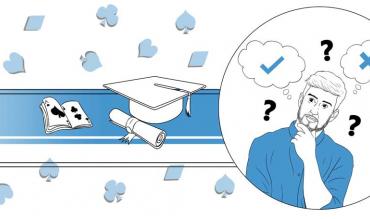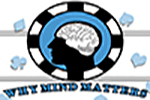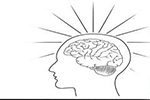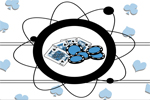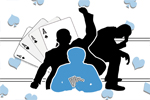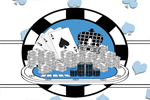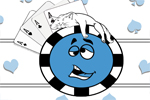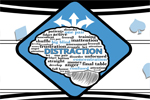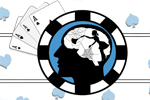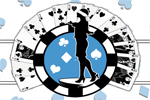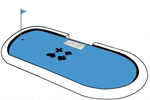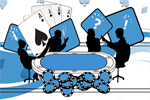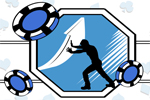Driving Range Poker
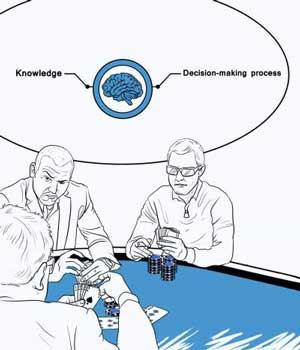
The last three chapters have focused on different aspects of decision making. Now I want to put it all together and show you how to work on your decision making like a golfer would work on their golf swing.
Decisions are at the core of how poker players compete. You can’t play poker without making them, and variance aside, your results are based on how your decisions stack up against your opponents. The decisions you make are the culmination of all the work you put into the game and can be broken into two parts that work together:
1. Knowledge
2. Decision-making process (the mental process that considers knowledge to arrive at a decision)
How to Make Better Poker Decisions
Knowledge without an active decision-making process means you’ll make plays automatically using only old unconscious knowledge [Don’t Trust Your Gut]. This is what happens when you’re tilted and fail to consider, for example, your image at the table. Missing a key factor in your decision-making process leads you to make mistakes that are often so bad you know immediately after the hand how you should have played it. Proof you weren’t lacking knowledge.
Players tend to focus solely on acquiring more knowledge and assume it will automatically increase their ability to make decisions. This is true to some degree. But training your decision-making process will allow you to play better under pressure, minimize the frequency and severity of mistakes, and make you a more consistent player. I’m not suggesting that poker players can’t improve by studying away from the table. I’m a big proponent of players watching videos, getting coaching, reading books and analyzing hands, among other methods, to strengthen their game. But this kind of work mainly improves a player’s knowledge of poker, not the process of making decisions.
What Does it Take to Play Better Poker?
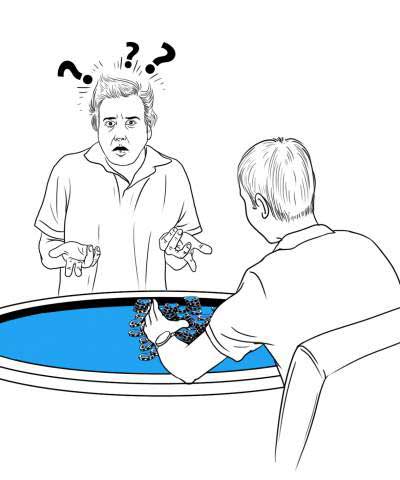
In golf, there’s a difference between the technical proficiency required to swing the club and the knowledge that a golfer has about the strengths and weaknesses in their game, the course (aka their opponent) and the game generally. Together this knowledge helps them create an optimal strategy for how to play a golf course and adapt to different conditions such as windy, wet or dry. But this increased knowledge doesn’t automatically mean they’re going to play better. Their swing must be well trained; otherwise, that knowledge is wasted. That’s why golfers spend hours on the driving range sharpening their swing.
Poker players must train their decision making to ensure all the work they put in off the table is worthwhile. Otherwise, some of the hours spent increasing their knowledge is wasted when they can’t apply it. The problem with poker is that there isn’t a way to practice making decisions as easily as a golfer can work on their swing at the driving range.
Training Decision Making
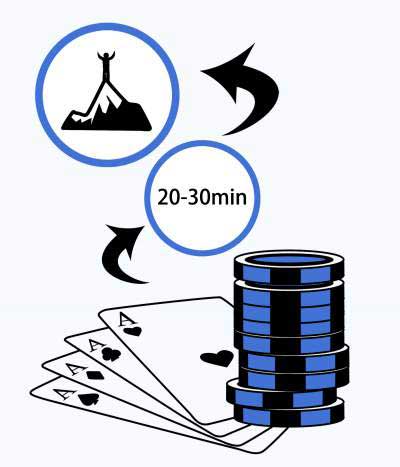
Have you ever spent time training your decision making? Most of you haven’t and that’s one reason you have glaring holes in your decision-making process. The goal is to master a process that guarantees you’ll always consider factors that are basic for you, and makes it likely that you’ll consistently apply new ones. That doesn’t mean you won’t face tough decisions. The numbers of unknowns in poker are so vast that you can’t avoid challenging spots, but when you do, you can be confident that you’ll think through all the important factors.
Achieving mastery requires a ton of quality repetitions. When it comes to training decision making, players typically get those reps by playing. The reps gained at the table are the best way to learn—you will learn more from thinking through a tough decision as you face it than studying hypothetical situations. But, training your decision making off the tablegives you easy reps that really add up over time. Together, they’ll make it more likely you’ll correctly think through those important hands when they come. In order to train your decision making, you first need to know how you make decisions. Golfers have swings that are unique like a fingerprint and I suspect the same holds true with poker players. In thelast ten years of talking with players about poker, I’ve never had the exact same conversation about how they think through a poker decision. There are obvious similarities in how players make decisions, but it’s important that you map this out for yourself.
Here are some ideas how you can train your decision-making process:
- Figure out how you make decisions. In my experience, players tend to make decisions in one of two ways:
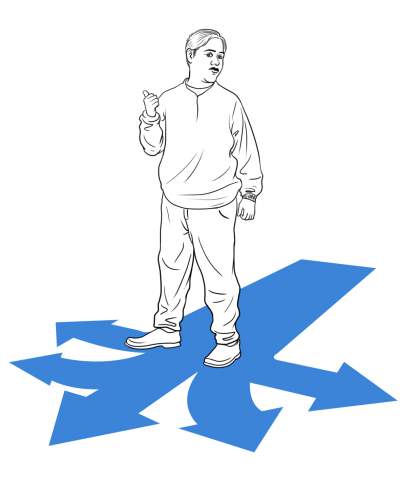
- A linear step-by-step process that is the same for every hand. For example, you may consider the following factors, in this order, when deciding what to do: prior action, prior history with an opponent, their image, their hand range, and opponent’s hand range. But when in your C-game, you forget to consider your image and your opponent’s hand range.
- A tailored process that considers all the same factors, but prioritizes them based on the ones that are most relevant in each hand, such as prior history with an opponent and their image. The order can change each hand. The common pattern is that players with this style rely on their feel for the table to determine the factors that will most heavily influence their decision.
- Find the situations where your decision making tends to break down most often. I go into detail about this in the Why You Make Bad Decisions chapter, so be sure to read it if you haven’t already. Regardless of why the breakdown occurs, push yourself in those spots to use your Strategic Reminder and consider the factors that typically go missing. This is hard and that’s why the reps you gain here are so valuable. Don’t expect perfection, just work on being better. Do this consistently and eventually you’ll automatically consider these factor seven when tilted, tired, or bored.
- Play lower stakes or fewer tables and force yourself to go through the decision-making process for each decision, even the easy pre-flop decisions. Do it for 20 to 30 minutes so you can maintain high focus and ensure that you think through each decision correctly. Some players like to do this as a warm-up for their session.
- Play while talking out each of your decisions. This makes it obvious when you’re missing something. Many players who make training videos or stream on Twitch say that articulating why they are making their decisions inevitably leads to better decisions. The value of doing this is so good they willingly give away their secrets to potential opponents.
- Load a bunch of hands in a hand replayer where you made a common mistake. Or record yourself playing and rewatch sections where you played poorly. Then while watching each hand play out, go through your decision-making process as if you were playing the hand again.
- When playing, focus on playing and not on trying to improve. However, be aware of changes in your decision-making process, so you can quickly notice if it starts to drop off. The faster you can spot it, the quicker you can correct it and the more you will. While your focus at the table is to play well, you are simultaneously learning.
- When playing, focus on playing and not on trying to improve. However, be aware of changes in your decision-making process, so you can quickly notice if it starts to drop off. The faster you can spot it, the quicker you can correct it and the more you will. While your focus at the table is to play well, you are simultaneously learning.
- If you play micro stakes, consider playing at play money tables. Although the quality of the play is different from real money games, you are there to practice thinking through a decision. Don’t focus on how other players are playing, just on thinking through every decision.
- Software like Poker Stove, SNG Wiz or Poker Snowie creates poker simulations where you can practice making decisions. They aren’t perfect, but short of magically hopping into a game where everyone is playing for real money except for you, they can be a good option.
- Find a group of players that you can join micro stakes tables together and practice making decisions. A lot of players find having a group of likeminded players to regularly play against and discuss hands is a great alternative to having a coach. The fact that you are playing together and learning together adds an element of competition and social pressure.
Dealing with Poker Decisions
Training decision making is just like developing any other skill or habit, the more you do it correctly, the stronger it gets and eventually becomes automatic. I understand players who are skeptical that poker decisions can be treated this way. Just remember that you’re not automating complex knowledge, you’re developing a routine or process to ensure you consider it.
Jared Tendler, MS, LMHC is licensed therapist specializing in sport psychology and is the leading authority on the mental game in poker. Throughout his nearly 10 years coaching poker players he has worked with over 500 players hailing from over 45 countries, including many of the top players in the world. He is also the author of two best-selling books on the subject, The Mental Game of Poker 1 and Poker 2.
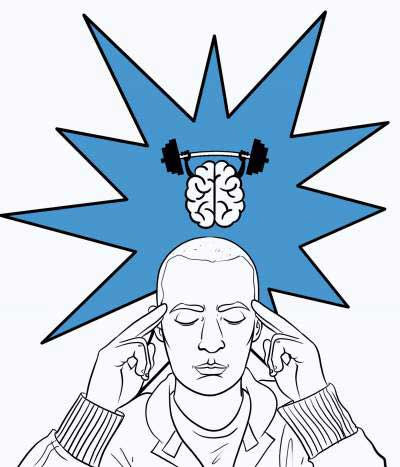 |
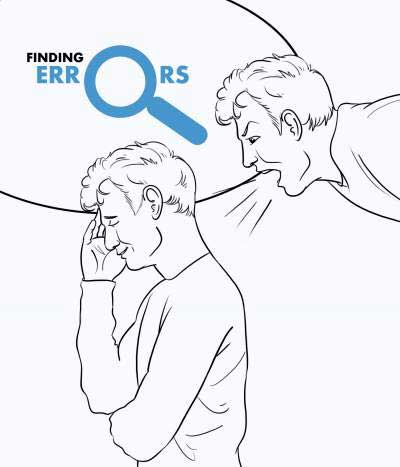 |
